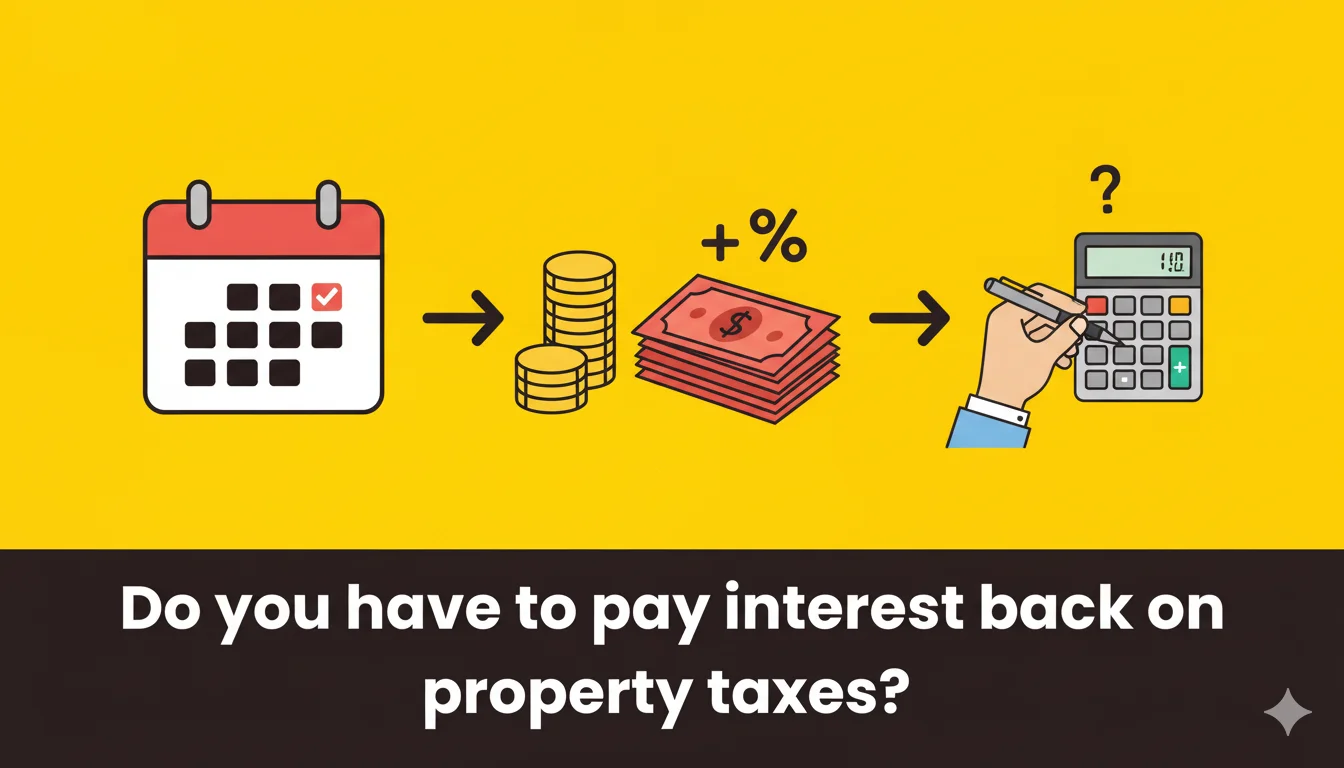Falling behind on property taxes can feel overwhelming. I’ve seen so many friends and clients struggle with it. What makes it worse is not knowing exactly what happens when you miss a payment. Will they just send reminders? Or does the amount you owe start growing quietly in the background? Let’s clear that up right now.
Does New York State Charge Interest on Back Property Taxes?
Yes, New York State does charge interest on unpaid property taxes. Interest is typically calculated at 1% per month, and it continues to add up until the balance is fully paid.
How Property Tax Interest Actually Works
Let’s break this down in simple steps, because understanding how interest on back property taxes accumulates can help you avoid bigger trouble down the road.
- Taxes Are Due on a Fixed Date
Every year, property taxes are due by a certain deadline. If you miss this due date, your payment is considered late, even if it’s just by one day.
- Interest Starts Right After the Deadline
Once the deadline passes, interest starts to build. In most places like New York, it’s 1% per month, and that’s not just a flat fee. It compounds, meaning if you wait months to pay, you’re not just adding 1% per month, you’re adding interest on top of interest.
- Each Local Area May Have Its Own Rules Too
While the state sets a base interest rate, cities and counties can add their own charges or policies. So, even if you think you’re within a grace period, your local tax office might already be calculating extra costs.
- It Adds Up Faster Than Most People Expect
A lot of homeowners don’t realize how quickly the number grows. A small bill can turn into a big financial headache in just a few months.
I once helped a close friend who thought he had more time to pay his back taxes. He delayed by six months, figuring a small interest fee wouldn’t hurt. But by the time he was ready to pay, his bill had jumped by nearly 7%, and he also had a lien warning waiting in the mail. That little delay cost him way more than expected, both financially and emotionally. Watching him scramble to fix things was a real eye-opener for me. Now, I always urge people to act quickly, even if they can’t pay in full right away.
What Happens If You Don’t Pay Your Property Taxes?
If you let your property taxes go unpaid, interest is just the beginning. Many homeowners don’t realize that falling behind can lead to a serious chain of consequences that affect their credit, their equity, and even their ability to keep their home. The government takes unpaid taxes seriously because those funds are used for local services like schools, roads, and emergency departments. So when taxes go unpaid, counties and cities move quickly to collect, and they have the legal tools to do it.
First, after the due date passes, you’ll begin to see interest charges appear on your tax balance. This might not seem like a big deal at first, a few dollars added to your bill each month, but it grows over time. If the balance isn’t paid, the local tax office may start adding penalties or late fees on top of the interest. These additional charges are designed to push property owners to act fast, and they make the total amount much harder to catch up on.
If you still don’t pay, your account may be marked as delinquent. According to Virginia state law (§ 58.1-3916), localities may charge up to 10% annually on delinquent property taxes. This isn’t just a label; it can trigger automated collection processes. Your local government may send you a formal notice warning that you’re at risk of a tax lien or tax foreclosure. A tax lien is a legal claim against your home for unpaid taxes, and it gives the government the right to collect from the value of your property. It doesn’t mean they take your house right away, but it does mean you can’t sell or refinance until the debt is cleared.
After a certain period, which varies by location, the situation can get even more serious. If your taxes remain unpaid, the government has the right to initiate a tax foreclosure process. This means they can legally take your property and sell it to recover the amount you owe. It’s a harsh outcome, especially when the original unpaid amount may have been relatively small.
Most homeowners never imagine losing their home over a few missed payments. But once legal action begins, it becomes more expensive and complicated to reverse. You may need to pay legal fees, redemption penalties, and back interest to regain full ownership. Some areas allow you to enter a payment plan or installment agreement, but even then, interest usually continues to accrue.
Another hidden issue is that delinquent property taxes can hurt your credit score, especially if they’re turned over to a collection agency or result in a public record. That makes it harder to qualify for loans, refinance your mortgage, or take out a line of credit. And if you’re trying to sell your property, tax liens can delay or even cancel the sale altogether.
I’ve seen many clients come to me hoping to sell their homes quickly, only to find out that their title is clouded by a tax lien. That one surprise can ruin a deal. It’s why I always advise homeowners to check on their tax status at least once a year, even if they think everything’s paid up. Mistakes and miscommunications do happen, and it’s better to catch a small issue early than to clean up a legal mess later.
So if you’re behind on property taxes, act now. Reach out to your local tax office, see if you qualify for a payment plan, and stay ahead of growing interest and penalties. A little action today can save you from massive stress tomorrow.
Can You Reduce or Stop Property Tax Interest?
If you’re behind on property taxes, you’re probably wondering if there’s any way to stop the interest from piling up. While you can’t usually erase it, there are a few options that can slow it down, reduce penalties, or make it easier to manage.
1. Talk to Your Local Tax Office
One of the most important things you can do is communicate early with your local tax authority. Many counties offer payment plans or installment agreements. These let you break up your overdue balance into smaller monthly payments. While interest usually still applies, it gives you breathing room and helps you avoid further penalties like liens or foreclosure.
2. Ask About Hardship Programs
Some local governments have programs for people facing financial hardship, especially seniors, veterans, or those with disabilities. These programs can freeze interest, delay foreclosure, or offer partial forgiveness in rare cases. You usually have to apply and prove your income or situation, but it’s worth looking into if you qualify.
3. Check for Legal Caps or Limits
Each state sets rules about how much interest can be charged. For example, New York charges 1% monthly, while other states may cap it at 10% annually. Knowing your area’s rules helps you understand how much the balance can grow, and if you’re being overcharged.
Here’s a simple breakdown:
| State Example | Monthly Interest | Annual Cap | Notes |
| New York | 1% | ~12% | Interest starts immediately |
| Virginia (varies) | Up to 0.83% | 10% | Set by local ordinance |
| Florida | Variable | Up to 18% | May vary by county or city |
4. Avoid Delaying Payments

Even if you can’t pay the full amount, paying something toward your balance can slow down the snowball effect of interest. Many areas apply your payment to the oldest part of your debt first, which helps minimize the growing charges.
5. Don’t Wait for It to Go Away
Interest on property taxes doesn’t just stop or go away with time. The longer you wait, the harder it gets to fix. If you’re planning to sell, refinance, or transfer ownership, clearing up any back taxes should be your first step.
Final Thoughts
Falling behind on property taxes can happen to anyone, but ignoring it only makes things worse. Interest charges grow fast, and they don’t stop until the debt is paid. The good news? You have options. Whether it’s starting a payment plan, checking for hardship relief, or simply staying informed, acting early makes all the difference.
If you’re unsure where to start or how this affects your property decisions, don’t stay stuck. Reach out to your local tax office or talk to a trusted real estate expert who’s dealt with this before, like I’ve done for many of my clients. A little guidance can save you from big trouble down the line.
Need Help Navigating Property Taxes or Selling a Home in Richmond, VA?
If you’re facing back taxes or unsure how interest might impact your property plans, you’re not alone, and you don’t have to figure it out on your own. At Buy and Sell Richmond, we help homeowners like you make smart decisions, even in tough situations.
Whether you’re looking to sell fast, settle a lien, or just understand your next move, Michell Pope, PhD, is here to guide you every step of the way with real answers, not just guesswork.
Get in touch today, and let’s turn your property stress into a clear plan that works for you.


